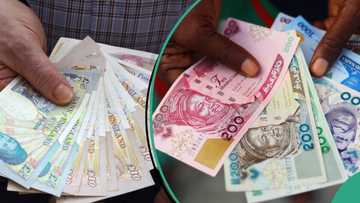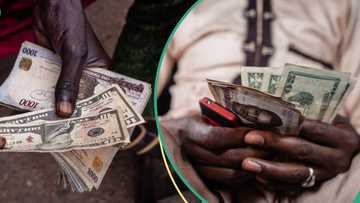Good News: Nigeria’s Foreign Reserve Rises as Naira Gains After CBN Sells Dollar to Banks, Others
- Nigeria's reserve has shown a continuous improvement in value over the past four weeks
- CBN data showed that the reserve rose to $195.01 million, suggesting greater market liquidity
- Analysts said the improvement would improve macroeconomic stability and currency management
Legit.ng journalist Zainab Iwayemi has over three years of experience covering the Economy, Technology, and Capital Market.
Nigeria's foreign exchange (forex) reserves increased by $195.01 million to $32.64 billion at the weekend, indicating that the market is expected to have more liquidity.

Source: UGC
The recent accretion marked the fourth consecutive increase in foreign exchange reserves after a month of declines.
The reserves increased by $89.76 million the week before. Prior to this, it had increased by $10.76 million and $132.68 million.

Read also
Traders sell dollars at new rates as naira recovers for second day amid rise in FX reserves
However, in the Nigerian Autonomous Foreign Exchange Market (NAFEM), at the close of business on Friday, May 17, the naira's value improved to N1,497.33 per dollar.
Throughout the week, the Central Bank of Nigeria (CBN) made three market interventions totalling $211 million in FX sales.
With trades completed between N1,301.00 and N1,593.00 per dollar, the NAFEM's total turnover climbed by 33.6% to $1.14 billion.
How analysts react
The expectation among analysts is that the ongoing FX build-up would increase market liquidity, according to The Nation's report.
Experts at Cordros Capital Group noted that the CBN's increased forex supply to banks and the somewhat revived interest of foreign portfolio investors (FPIs) have reduced the naira's volatility and boosted market liquidity last week.
Cordros Capital stated:
“Looking forward, we expect forex liquidity to improve, supported by inflows from FPIs even as the CBN sustains their intermittent interventions. Nevertheless, we think market liquidity may be insufficient to trigger a significant appreciation in the naira.”
Experts in finance and economics agreed that the increase in foreign reserves was positive news for the nation's macroeconomic stability and currency management.
According to analysts, changes in the country's forex management regulations, a continuous increase in crude oil production, and an improvement in the price of oil globally will help lessen the country's unpredictable forex position.
Olatunde Amolegbe, managing director of Arthur Steven Asset Management, stated that the government's ongoing initiatives to promote liquidity and stability in the foreign exchange market will be bolstered by the ongoing increase in foreign exchange reserves.
Amolegbe said:
“The increase is a positive signal for improved liquidity in the forex market. This should ultimately help to stabilize the exchange rate of the naira or even strengthen it against the dollar if the increase is steady and consistent.”
Prof. Uche Uwaleke, president of the Association of Capital Market Academics in Nigeria, stated that any rise would better position the CBN to fulfil its foreign exchange commitments and intervene in the FX market.
Uwaleke said.
“If this development is sustained, we are likely to witness an appreciation of the naira in the forex market and more stability in the exchange rate following improved liquidity. This is one positive development capable of keeping away destructive speculators from the forex market.”
Uwaleke, however, said Nigeria needs to curb excessive import dependence to support its forex recovery.
According to him, export-based diversification remains the only sustainable solution to the present forex crisis.
He added that to curb the demand pressure, the government should compel a change in consumption behaviour by enacting a 'Buy Nigeria law' akin to the 'Buy America Act' of 1933 and, recently, the 'Build America, Buy America Act' of 2021.
He added:
“Also, Nigeria’s import data support revisiting and scaling up the CBN’s currency swap deal with the Peoples Bank of China. Given that the bulk of Nigeria’s imports are from China, it stands to reason, therefore, to explore ways of bypassing the dollars and settling these transactions in the Yuan.
This was the idea behind the currency swap with China which was largely inadequate in size. In order to increase the stock of Yuan in our external reserves, Nigeria can issue panda bonds, which are bonds denominated in the Chinese Yuan and are considered cheaper than Eurobonds.”
Bloomberg raises alarm over depleted external reserve
Legit.ng also reported that Bloomberg findings showed Nigeria is depleting its foreign exchange reserves at a rate not witnessed in the last four years.
This follows news that the currency of the largest oil producer in Africa has recovered most of its losses following a 43% devaluation in January.
The event transpired after the CBN implemented policies to enhance liquidity, luring capital inflows, and empowering the market to set the value of the naira.
Proofreading by James Ojo Adakole, journalist and copy editor at Legit.ng.
PAY ATTENTION: Unlock the best of Legit.ng on Pinterest! Subscribe now and get your daily inspiration!
Source: Legit.ng





